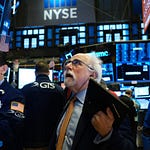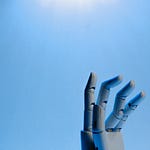
I grew up terrified of water shortages.
Every summer, the newspapers and radio blared the dire warnings:
We’re in a crisis.
We’re running out of water.
Our aquifer is nearly dry.
Take shorter showers.
Wash your dishes by hand.
Only drink what you need.
Watering your lawn is absolutely forbidden.
I never once took a shower that wasn’t rushed.
Baths were exclusively for special occasions.
(My dad, in an attempt to save money, did nothing to assuage my fears.)
But it turns out the whole water-shaming gambit was a scam.
While 100,000 tax-paying citizens scrimped and saved on water, Nestlé was stealing 976 million liters from our city’s aquifer each year.
When their contract came up for renewal, I put in a bid of $4.00 per million liters, a whopping 7.8% more than the $3.71 per million liters Nestlé was paying to drain our town dry, but our corrupt government turned me down.
Nestlé now legally takes 1.3 billion liters per year just from my town, and water-shaming the public continues.
There’s a stretch of highway in Port Talbot, Wales, that makes me furious.
The speed limit drops from 70MPH to 50MPH.
It’s enforced with dozens of cameras that calculate your average speed and automatically mails an outrageous fine to your house if you go over.
Because of the drop in speed, traffic backs up for miles. It takes at least twenty minutes to slog through, every time.
Which gives you enough time to read the mass-shaming roadside signs:
Pollution kills.
Slow down, save lives.
Speeding causes cancer.
Poor air quality kills, reduce your speed.
But being stuck in traffic also gives you time to look around at the city you’re supposedly helping to save from horrible respiratory diseases.
It’s covered in smokestacks.
There’s no other way to say it: Port Talbot is a Shittsburg, a refinery town that enriches a few corporate shareholders and causes thousands of deaths each year due to heart disease, lung cancer, and asthma.
In fact, it’s the most polluted place in the United Kingdom.
But, rather than fining, regulating, or shutting down the corporations that are spewing the vast majority of the poisons that are literally murdering people, Britain pollution-shames its drivers and fines tens of thousands of middle-class drivers each year for not “doing their part.”
My astute readers will know exactly where I’m going with this
The sociopaths who run the government think it’s time that the masses no longer deserve to eat meat.
And there’s an easy way to keep the bottom half from eating meat while enriching the anti-social elites who run the cartel:
Just tax it out of our budget range.
Beef prices are already up 50% since last year.
Most people already can’t afford filet mignon — if ground beef goes to $40/pound, almost everyone I know will save tacos for their birthday. Pretty soon, beef will be the next caviar or champagne.
And in the meantime, they’ll weaponize our honor-shame culture to shame us into avoiding meat.
Yes, we absolutely need to lower greenhouse gas emissions. But after centuries of poisoning us for profit, corporations now want us to make lifestyle changes so they can continue to turn a profit from emitting greenhouse gases.
But we know what they also know:
Meat isn’t the problem
In America, agriculture makes up just 10% of greenhouse gas emissions:

Globally, the picture seems a bit worse at first…

But that’s only until you read the fine print:

So, animals are responsible for somewhere in the ballpark of 19.2% of all global greenhouse gas emissions. Even without any offsets, it’s still less than a quarter of the total.
In other words: The overwhelming majority of GHGs are caused by transport, industry, and power/heat production.
(And animals aren’t farting nitrous oxide, CFCs, and all the other lethal poisons that we should be really worried about.)
Just take a look at the leading emitter of each greenhouse gas:
Notice what’s not on the leading source for any single greenhouse gas?
Animals.
They simply aren’t the main problem. (And even for the one GHG that cows emit the second most, there are tons of companies working on methane capture — I’ve seen two projects in action myself.)
But instead of going after the corporations that are literally murdering hundreds of thousands of people each year, what do corporate-controlled governments do?
Meat-shame us like it’s our fault.
George Monbiot rightly calls this micro-consumerist bollocks:
“Tiny issues such as plastic straws and coffee cups, rather than the huge structural forces driving us towards catastrophe. We are obsessed with plastic bags. We believe we’re doing the world a favour by buying tote bags instead, though, on one estimate, the environmental impact of producing an organic cotton tote bag is equivalent to that of 20,000 plastic ones.”
If only we’d stop watering our lawns… driving so fast… and eating hamburgers?
Transport: Could easily go all-electric.
Industry: Could easily go all-electric.
Power/heat production: Could easily go geothermal and hydro and tidal.
But these are three of the strongest lobby-bribing groups in the world.
Heck, Chevron would rather send people to prison than pay fines they legally owe for poisoning tens of thousands of people.
Obviously, they’ll keep polluting until the moment we put them out of business.
Corporations could transition to 100% renewables within a year if they chose to re-allocate, but they’d rather do the thing we tell children not to do:
Bully the weak.
I call bull$#!t
Literal bull$#t is what keeps our soil alive.
For thousands of years, hundreds of millions of ruminants sustainably roamed the plains of North America and Europe and Asia, fertilizing the soil and supplying homo sapiens with unlimited amounts of life-giving protein and fat.
If the market for ruminants is systematically destroyed, it’s not like the government is going to let all the Angus and Plains Bison and Longhorns just go wild and re-populate the plains.
Once ruminant populations are decimated, they’ll become sideshows in zoos, museums, and circuses.
In other words, the #1 creator of natural soil on planet earth will simply cease to exist…
…leaving us more reliant on AgTech companies to produce synthetic soils and fertilizers to keep our desperate dirt producing food for a 10+ billion person world.
Getting rid of meat animals is quite literally anti-human, anti-nature, and anti-future.
We need way more bull$#!t, not less.
There are good reasons to go vegetarian or vegan, to be sure.
It’s “more humane”
Some people argue that it’s cruel to slaughter animals to eat. I agree — in fact, after helping an organic farmer friend kill a bunch of Christmas turkeys for his clients, I went vegetarian for a whole year.
But do you know what’s even worse than quickly and instantly killing turkeys in an abattoir? When a coyote or fox or wolf or rat shreds one to pieces in the wild.
Humans are undeniably cruel to each other, but we’re nicer to animals than anything they encounter in nature.
Just Google “cheetah attacks antelope” or “crocodile devours wildebeest.”
Can we do better than the current monopoly model? Absolutely. Slaughterhouses are horrible. We need to return to the ancient ways of natural, sustainable meat harvesting.
It’s “healthier”
Healthwise, there are certainly benefits to going veg/vegan versus the Standard American Diet (SAD.)
But that’s also true for keto, paleo, and carnivore diets. Pretty much anything beats corporate-created sugar-filled American “food.”
And the longest-lived people in the world still eat meat, so that rules out the longevity argument.
It’s “cleaner”
To be clear, modern mass-scale beef farming is horrible for the environment.
Eating two feedlot burgers per week for a year creates as much greenhouse gas as heating a house for three months. Plus all the chemicals, fertilizers, pesticides, herbicides, and deforestation are having disastrous consequences for the environment. Modern monopoly beef is bad.
Consumers have demanded cheap meat, and farmers have gone to desperate measures to stay in business, which is why the Midwest is littered with horrendous mega-feedlots.
But remember, homo sapiens once ate meat sustainably and ecologically for millennia.
The corporatist monopolies who control BigAg are a serious problem, and there is room for lots of innovation — and returning to the ancient ways. To their credit, beef farmers globally have committed to cutting their environmental impact by 30% within eight years, which is way better than the fossil fuel industry. But ruminants aren’t the ultimate problem — humans are.
If we drew down the human population to a reasonable figure, and returned animals to wildland, we could eat meat sustainably forever. I respect vegetarian and vegan views and even applaud them (my sister, after all, has been a vegetarian for nearly twenty years), but that’s not the point of the article-- it's not to make a judgment about the morality/immorality of eating meat or even the environmental sustainability of meat in an overpopulated world, but simple to question the financial motives behind the coercive transition. My concern is always about corporate corruption. And I see lots of it here.
We need to get back to carbon-negative, soil-positive, regenerative, natural, sustainable, family-stewarded, wild meat protein production.
It’s not the cow, it’s the how.
Getting to (actual) sustainability
Some people put forward the extremely weak argument that if everyone in the developing world ate as much meat as Westerners do, it wouldn’t be sustainable.
And that’s absolutely true.
But is that meat’s fault?
As history has clearly proven, eating meat is absolutely sustainable — it’s the human population that’s grown unsustainable.
Remember: humans have eaten meat sustainably since the beginning of time.
What changed: animals, or us?
The real fix to the “unsustainable meat crisis” is a massive draw-down of homo sapiens, not cows.
Instead of taxing beef, why not stop subsidizing childbirth?
Why not incentivize having less kids?
Why not streamline and incentivize fostering and adoption?
No, I’m not talking about an idiotic one-child policy, force sterilizations, or any of that nonsense.
People can do what they want and have as many kids as they want — so long as the rest of us don’t have to pay for it.
And we should definitely re-direct all that meat-shaming toward having thoughtful conversations about a.) overpopulation and b.) the real poisoners of the planet.
So why are we ACTUALLY meat-shaming the masses?
“I think all rich countries should move to 100% synthetic beef.” — Bill Gates (who emits 107X more carbon emissions than the average person)
Cicero and the Romans asked a good question:
“Cui bono?”
Who profits?
There are two leading contenders:
1. Today’s polluters
Banning meat isn’t about “saving the planet” any more than my hometown cared about saving water or the UK cares about the health of people in Port Talbot — it’s all about allowing the bona fide criminals to continue to pollute for a profit.
Making meat unaffordable for the masses buys polluters a little more time to poison us into oblivion for short-term profits.
2. Tomorrow’s food manufacturers
If you follow the money, you soon realize that all this meat-shaming (including most of the popular anti-meat documentaries) are actually just another corporate ruse to conjure up a market for vegan products:


Consider:
Beyond Meat is already a $6 billion company, and its largest investor is Al Gore’s Kleiner-Perkins.
Impossible Foods is aiming for a $7 billion valuation, backed by Serena Williams.
Jeff Bezos, Bill Gates, and Richard Branson are all backing a new vegan meat startup.
Sadly, “saving the planet” has become a trojan horse for new industries to gain protein market share.
The natural meat industry is far from perfect, and we would do well to ban feedlots and smash meat monopolies like Tyson and Cargill while supporting the family farm like never before, but getting rid of hundreds of millions of soil-producing animals will have disastrous long-term consequences for planet earth.
Oh, and also jobs.
The American meat industry alone contains more than 5.4 million jobs — synthetic vegan “food,” on the other hand, is already being mass-produced in automated factories.
Trust nature
Call me old-fashioned, but I don’t want to eat factory-engineered synthetic foods made by corporations with massive conflicts of interest.
And don’t tell me beef can’t be sustainable.
I get my grass-fed beef from the multi-generational farm beside my wife’s office, from animals reared on commons land that has been sustainably feeding cows and humans for at least 5,000 years.
It takes a galling amount of hubris to think that indoor-manufactured factory vegan “food” is better than nature’s way, and that cows are the problem when clearly it’s humans that are overpopulated.
The historic facts are undeniable: Homo sapiens adapted to natural, outdoor, organic food over an untold number of generations, and I don’t for a second buy the notion that tomorrow’s fake factory foods won’t have dire outcomes for our fragile species.
All this false food is and will lead to further systemic malnutrition — which is, of course, perfectly acceptable to private medicine, Big Pharma, and the politicians they sponsor.
We need to trust nature again, not “the market.”
There is zero doubt in my mind that weaning homo sapiens off of the traditional protein sources that have sustainably sustained our species for millennia in favor of factory-created synthetic foods will not be positive for the long-term wellbeing of our global family.
But hey, at least another billionaire will get rich.















